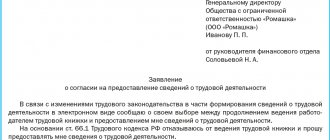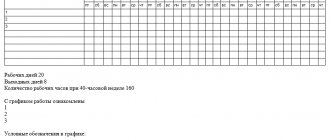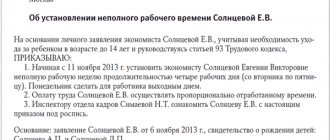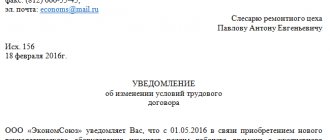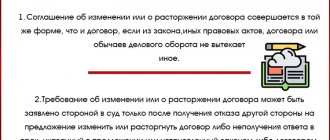WHAT IS PVTR
So, PVTR is a normative act, that is, a legal document containing labor law norms[1] and mandatory for execution by a certain circle of persons: employees of one employer. LNAs act as an organic component of labor law. If they are adopted within the scope of their competence and in compliance with the established procedure, they are binding on employees and the employer in the same way as the Labor Code of the Russian Federation.
If we look at the list of issues that should be contained in the PVTR, we will see that this document is universal in its structure. On the one hand, labor relations are a fairly regulated area. The Labor Code allows you to find answers to many questions that arise in the daily activities of an organization. However, like any document of a “general” nature, it does not take into account many nuances specific to individual employers.
PVTR allow you to make up for this: fix the dates of salary payments, set the time and order of lunch breaks for different departments, and a list of positions with irregular hours. But the most important thing is that with the help of PVTR you can detail the requirements for labor discipline.
For example, you want to see your employees neat - enter this requirement into the PVTR and you can be subject to disciplinary action for showing up at the workplace in torn jeans. You don’t like that your employees communicate incorrectly with each other and (or) with clients - indicate in the PVTR that politeness is part of labor discipline, and you will have a much better chance of winning in court a dispute about holding the employee accountable for rudeness. If you don’t like the fact that employees use social networks during working hours, include in the PVTR a requirement to comply with the rules of behavior on the Internet, and you will have a tool for influencing those who like to “surf” the Internet, even to the point of dismissal[2]. At its core, PVTR is a universal tool for maintaining labor discipline in a team.
SOWY.RU
1. General Provisions
1.1. Internal labor regulations are a local regulatory act of the Company. 1.2. These Rules determine the internal labor regulations in the Company, the procedure for hiring and dismissing employees, the basic rights, duties and responsibilities of employees and the Company, working hours, rest periods, incentive and penalty measures applied to employees, as well as other issues of regulating labor relations. 1.3. The internal labor regulations and amendments to them are approved by the Management Board of the Company. 1.4. Compliance with the Internal Labor Regulations is mandatory for all employees of the Company. 1.5. An employee of the Company gets acquainted with the Internal Labor Regulations upon hiring (before signing an employment contract) against signature. When making changes and (or) additions to the Internal Labor Regulations or approving the new edition of the Internal Labor Regulations, the Company is obliged to familiarize all employees of the Company with these changes.
2. Hiring
2.1. Hiring to the Company is carried out on the basis of a concluded employment contract. 2.2. When applying for a job at the Company, the administration is obliged to require the applicant to provide: - a passport or other identification document; — a work record book, drawn up in the prescribed manner, with the exception of cases when an employment contract is concluded for the first time or the employee starts working on a part-time basis; — insurance certificate of state pension insurance; — a diploma or other document on education, qualifications or special knowledge, if the job for which the employee is hired requires appropriate professional training. Hiring is formalized by an order issued on the basis of a concluded employment contract. The order is announced to the employee against signature within three days from the date of actual start of work. When concluding an employment contract for the first time, a work book and an insurance certificate of state pension insurance are issued by the Company. When issuing a work book or an insert to it to an employee, the Company charges him a fee, the amount of which is determined by the amount of expenses for their acquisition, with the exception of cases of mass loss by the Company of workers’ work books as a result of emergency situations (ecological and man-made disasters, natural disasters, riots and other emergency circumstances), cases of incorrect initial filling of the work book or the insert in it, as well as cases of their damage through no fault of the employee. 2.3. When an employee is hired or transferred in the prescribed manner to another job within the Company, the latter is obliged to familiarize the employee with the assigned work (job description), terms of remuneration, and explain to the employee his rights and obligations. The Company's HR service is obliged to: - familiarize the employee with these Internal Labor Regulations and other local regulations directly related to the employee's work activity; — provide the employee with instructions on safety precautions, industrial sanitation, fire protection and other labor protection rules; — warn the employee about the obligation to preserve information constituting a commercial secret of the Company, and about the responsibility for its disclosure or transfer to other persons, provided for by the Regulations on the organization of the protection of information constituting a commercial secret.
3. Termination of the employment contract
3.1. Termination of an employment contract can only take place on the grounds provided for by labor legislation.
4. Basic rights and obligations of employees
4.1. The employee has the right to: - conclude, amend and terminate an employment contract in the manner and under the conditions established by the Labor Code of the Russian Federation and other federal laws; - providing him with work stipulated by the employment contract; — a workplace that complies with state regulatory requirements for labor protection and the conditions provided for by the collective agreement; — timely and full payment of wages in accordance with their qualifications, complexity of work, quantity and quality of work performed; — rest provided by the establishment of normal working hours, reduced working hours for certain professions and categories of workers, the provision of weekly days off, non-working holidays, paid annual leave; — complete reliable information about working conditions and labor protection requirements in the workplace; — professional training, retraining and advanced training in the manner established by the Labor Code of the Russian Federation and other federal laws; — participation in the management of the organization in the forms provided for by this Labor Code of the Russian Federation and other federal laws; — protection of one’s labor rights, freedoms and legitimate interests by all means not prohibited by law; — resolution of individual and collective labor disputes in the manner established by the Labor Code of the Russian Federation and other federal laws; - compensation for harm caused to him in connection with the performance of his job duties, and compensation for moral damage in the manner established by the Labor Code of the Russian Federation and other federal laws; — compulsory social insurance in cases provided for by federal laws. The employee has other rights provided for by the labor legislation of the Russian Federation. 4.2. The Company's employees are obliged to: - conscientiously fulfill their job duties, observe labor discipline, promptly and accurately execute the orders of the Company administration and immediate supervisor, use all working time for productive work; — comply with internal labor regulations; — comply with established labor standards; — carry out production tasks and instructions efficiently and on time, work to improve your professional level; - maintain cleanliness and order in your workplace, in office premises, follow the established procedure for storing documents and material assets; — treat with care the property of the Company (including the property of third parties located in the Company, if the Company is responsible for the safety of this property) and other employees; - effectively use personal computers, office equipment and other equipment, economically and rationally use materials and energy, other material resources, take care of entrusted property; — comply with labor protection and occupational safety requirements, fire safety rules; - not to use for speeches and publications in the media, both in the Russian Federation and abroad, information received by virtue of official position, defined by special documents of the Company, as a trade secret, the dissemination of which may harm the Company or its clients; — show initiative and enterprise in work, value the honor and authority of the Company, show respect and benevolence towards other employees of the Company and its clients; — upon dismissal, return the teaching aids, equipment and other material assets purchased at the expense of the Company and transferred to the employee for use. In case of loss or loss of the latter, the employee reimburses their cost within the limits established by the Labor Code of the Russian Federation and other federal laws; — by order of the Company’s management, go on business trips; — attend seminars and other events held by the Company to improve the skills of its employees; — comply with local regulations of the Company; — immediately inform the Company or immediate manager about the occurrence of a situation that poses a threat to the life and health of people, the safety of the Company’s property (including property of third parties held by the Company, if the Company is responsible for the safety of this property); 4.3. The range of duties that each employee performs in his specialty, qualifications, position is determined by the employment contract and job description.
5. Basic rights and obligations of the Company
5.1. The Company has the right: - to conclude, amend and terminate employment contracts with employees in the manner and on the terms established by the Labor Code of the Russian Federation and other federal laws; — conduct collective negotiations and conclude collective agreements; — encourage employees for conscientious, effective work; — require employees to perform their job duties and take care of the Company’s property (including the property of third parties owned by the Company, if the Company is responsible for the safety of this property) and other employees, to comply with these Rules; — bring employees to disciplinary and financial liability in the manner established by the Labor Code of the Russian Federation and other federal laws; — adopt local regulations. 5.2. The Company is obliged to: - comply with labor legislation and other regulatory legal acts containing labor law norms, local regulations and employment contracts; — provide employees with work stipulated by the employment contract; — properly organize the work of employees, providing them with the necessary equipment, tools, technical documentation and other means necessary for the performance of their labor duties; — ensure safety and working conditions that comply with state regulatory requirements for labor protection; — ensure strict adherence to labor discipline, apply enforcement measures to violators of labor discipline; — comply with the terms of remuneration stipulated in the employment contract, pay the full amount of wages due to employees; — assist employees in improving their qualifications and improving professional skills; — familiarize employees, upon signature, with the adopted local regulations directly related to their work activities; — carry out compulsory social insurance of employees in the manner established by federal laws; — perform other duties provided for by labor legislation and other regulatory legal acts containing labor law standards, local regulations and employment contracts. 5.3. The Company, in carrying out its duties, must strive to create corporate relations among employees, their interest in the development and strengthening of the Company’s activities.
6. Working time and rest time
6.1. In accordance with current legislation, a _____ (five-day, six-day) working week lasting ___ hours with two days off (___ and ____) is established for the Company's employees. 6.2. The beginning and end of the working day is established for the Company’s employees, taking into account its production activities and is determined by the work schedule approved by the Company and fixed in the employment contract. By agreement between the employee and the Company, the employee is given one of the following work start and finish schedules: from ____ to ___ hours or from ____ to ___ hours. 6.3. The duration of the lunch break is ___, which the employee can use at his own discretion from ___ to ___ hours. 6.4. When fulfilling their obligations, employees may be required to work outside the normal working hours, and therefore, individual employees are assigned irregular working hours. The list of positions of employees with irregular working hours is approved by order of the employer. 6.5. On the eve of weekends and holidays, the working day is reduced by 1 hour. 6.6. In accordance with the current labor legislation in the Russian Federation, work is not performed on non-working holidays and weekends. Work on weekends and holidays is permitted only in case of official necessity by order of the General Director of the Company. 6.7. The order of granting vacations is determined in accordance with the vacation schedule. The duration of annual paid leave is 28 calendar days. Employees who have irregular working hours are provided with an additional annual paid leave of 3 calendar days. The division of leave into parts is carried out in accordance with the Labor Code of the Russian Federation. 6.9. For family reasons and other valid reasons, based on a written application, an employee may be granted leave without pay, the duration of which is determined by agreement between the employee and his immediate supervisor.
7. Remuneration
7.1. Salaries are paid to employees every two weeks on ____ and ____ dates. 7.2. Payment of wages is made by transferring non-cash funds to the employee's current account or in cash at the cash desk - at the employee's choice. 7.3. Payment of wages is made in rubles.
8. Rewards for success at work
8.1. For highly professional performance of job duties, increased labor productivity, long-term and impeccable work and other successes in work, the following incentive measures for the Company's employees may be applied: moral encouragement in the form of an announcement of gratitude; material incentives in the form of a bonus or a valuable gift. Moral encouragement is announced by order of the General Director of the Company, brought to the attention of the team and entered into the employee’s work book. Material incentives are issued by order of the General Director of the Company on his own initiative or at the request of the head of the relevant structural unit in accordance with the Regulations on bonuses in the Company.
9. Responsibility for violation of labor discipline
9.1. For failure to perform or improper performance through the fault of an employee of the assigned job duties, the following disciplinary sanctions may be applied: - reprimand; - reprimand; - dismissal on the grounds provided for by the Labor Code of the Russian Federation. 9.2. An order on the application of a disciplinary sanction is issued, which is announced to the employee against signature.
10. Financial liability of the employee and the Company
10.1. The employee is obliged to compensate the Company for direct actual damage caused to him. The amount of damage is determined in accordance with the rules established in the Labor Code of the Russian Federation. The company has the right, taking into account the specific circumstances in which the damage was caused, to fully or partially refuse to recover it from the guilty employee.
11. Regimes established in the Company
11.1. The Company has established the following modes (indicate the modes that are established in the Company (for example, fire safety, access control, secrecy mode, confidentiality mode)). 11.2. Describe in detail the regimes established in the Company. 11.3. The employee is obliged to comply with ____ (indicate the name of the regime that the employee is obliged to comply with).
WHO SHOULD HAVE PVTR
In accordance with the Labor Code of the Russian Federation, employers who use hired personnel to achieve their goals must have a PVTR, and there are only two exceptions to this rule:
1. Micro-enterprises. According to Art. 309.2 of the Labor Code of the Russian Federation, an employer who is a small business entity classified as a micro-enterprise has the right to refuse, in whole or in part, from adopting LNA containing labor law norms, moving the norms governing relations with employees into employment contracts.
Microenterprises include organizations that meet the following criteria[3]:
• the average number of employees should not be more than 15 people;
• income summed up for all types of activities carried out should not exceed 120 million rubles per year (Resolution of the Government of the Russian Federation dated April 4, 2016 No. 265 “On the maximum values of income received from business activities for each category of small and medium-sized businesses”) .
2. Individuals who hire personnel to meet their personal needs.
HOW TO DEVELOP AND ADOPT PVTP
The law gives us clear guidelines for the development and adoption of the PVTR. According to Art. 190 of the Labor Code of the Russian Federation, this LNA must be adopted taking into account the opinion of the representative body of workers (if there is one).
In addition, this article contains another very interesting statement: “PVTR, as a rule, are an annex to the collective agreement . Why is it interesting? Yes, because the wording “as a rule” implies the possibility of exceptions. Of course, in the absence of a collective agreement, there is no need to talk about appendices to it at all, but even if there is one, the PVTR may well be drawn up as a document independent of it (which is much more convenient for the employer).
The author’s personal observations show that PVTR as an annex to a collective agreement are less common than PVTR as an independent LNA. In our opinion, the fact is that the significance of the act is so great that even at large enterprises with a reputable and active trade union, they prefer to approve this document separately.
The procedure for taking into account the opinion of the representative body of workers - an almost step-by-step algorithm for this process - is established in Art. 372 Labor Code of the Russian Federation.
If the organization does not have an elected body of employees, then no approvals are needed and, accordingly, the PVTR is approved after internal approval by officials of the organization (each employer determines the need and procedure for such approval independently).
Who approves the internal labor regulations of the organization?
A unified form of rules has not been approved, so the employer develops them independently, on his own. Thus, the answer to the question will be this: internal labor regulations are approved by the employer.
Developing such a document from scratch is often problematic for employers. When drawing up rules, you can rely on the Model Internal Labor Regulations for workers and employees of enterprises, institutions, organizations, approved by Decree of the USSR State Committee for Labor No. 213 of July 20, 1984. However, do not forget that the model rules were approved more than thirty years ago and are partially outdated .
Internal regulations (you can download a sample document at the end of the article) should regulate the main issues of labor relations. Thus, the rules need to consider the main obligations and rights of the parties, incentive measures and the procedure for imposing penalties. In addition, internal labor regulations are adopted to maintain discipline in the team, coordinated and effective work, and help increase productivity in production.


